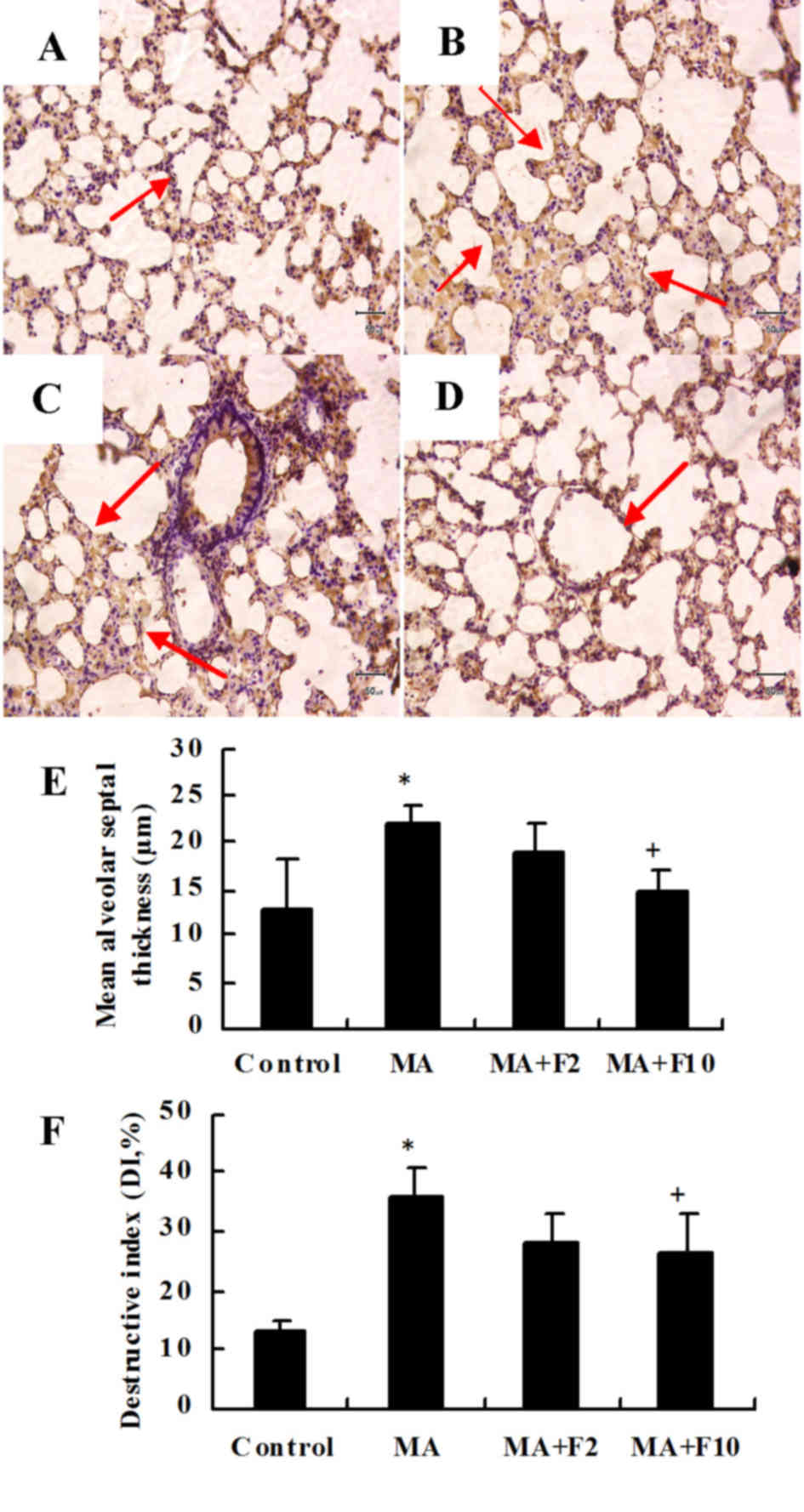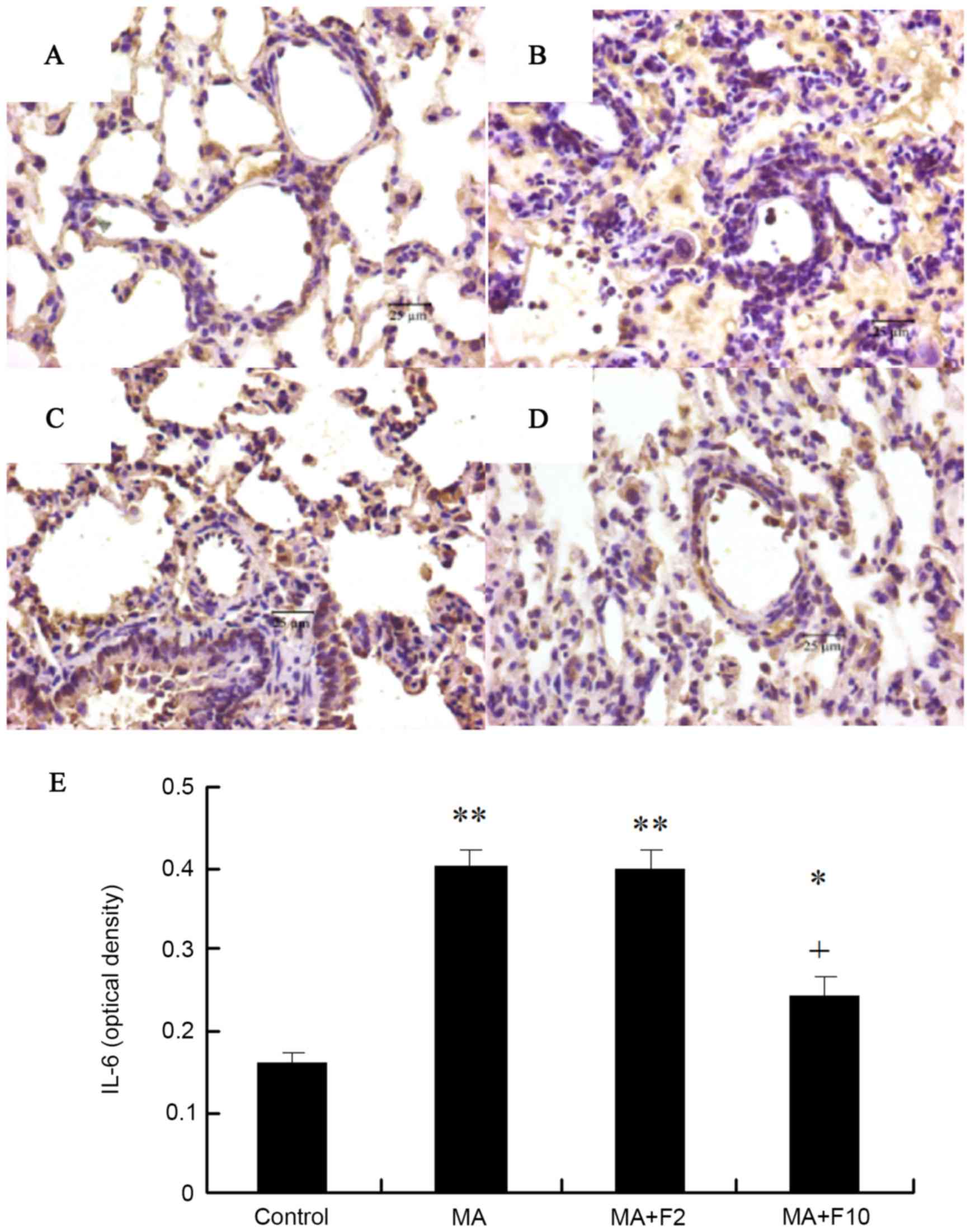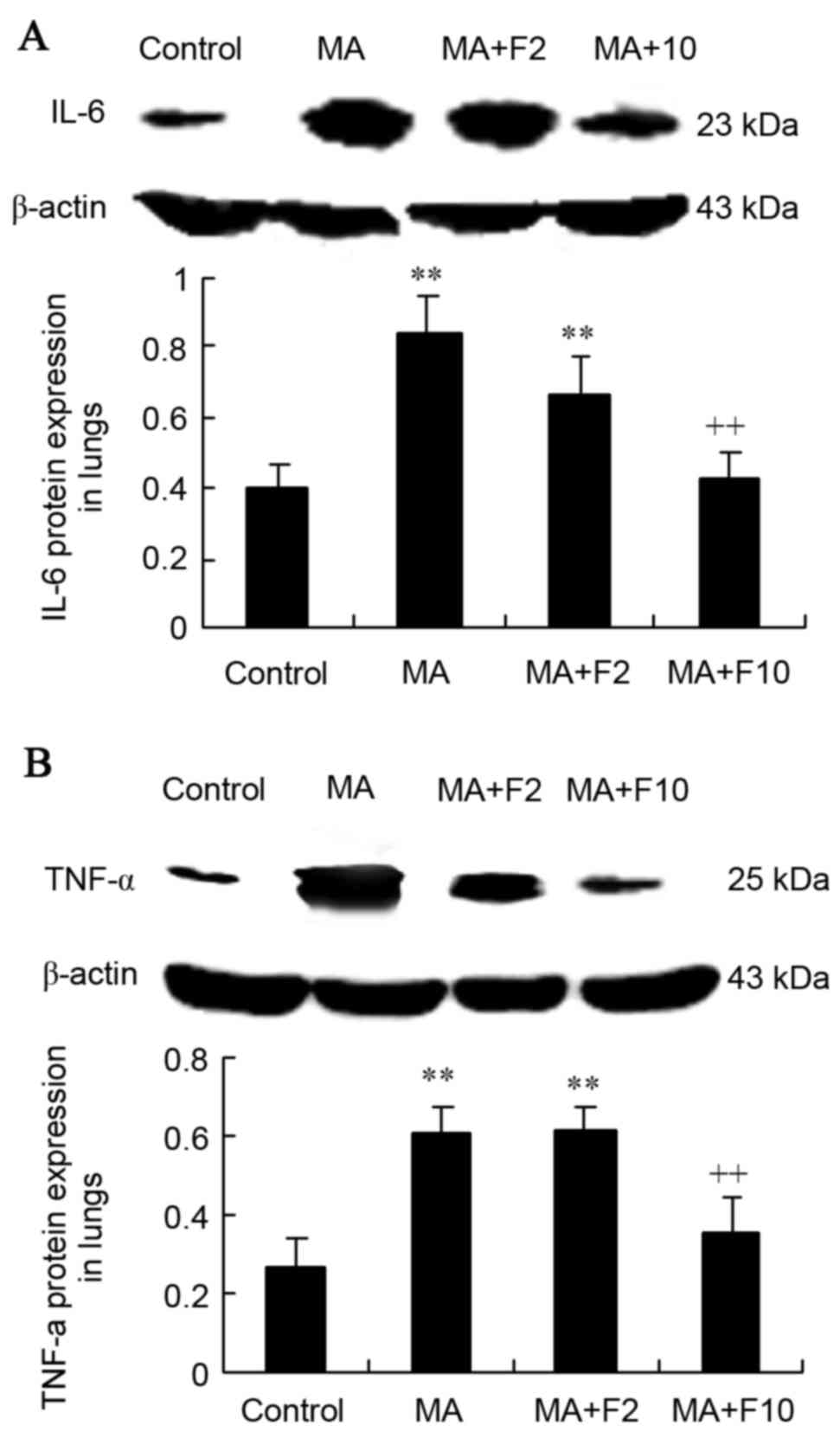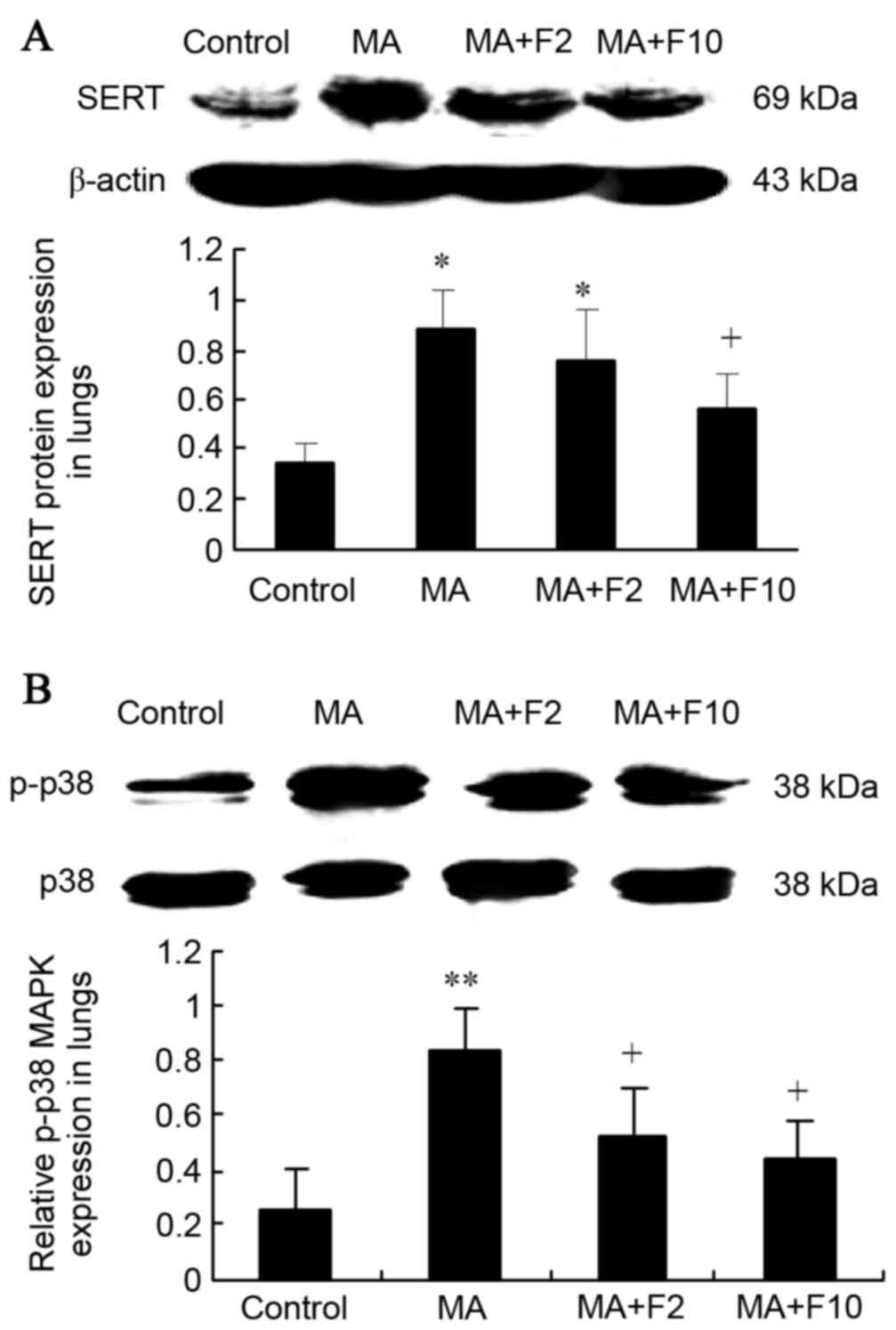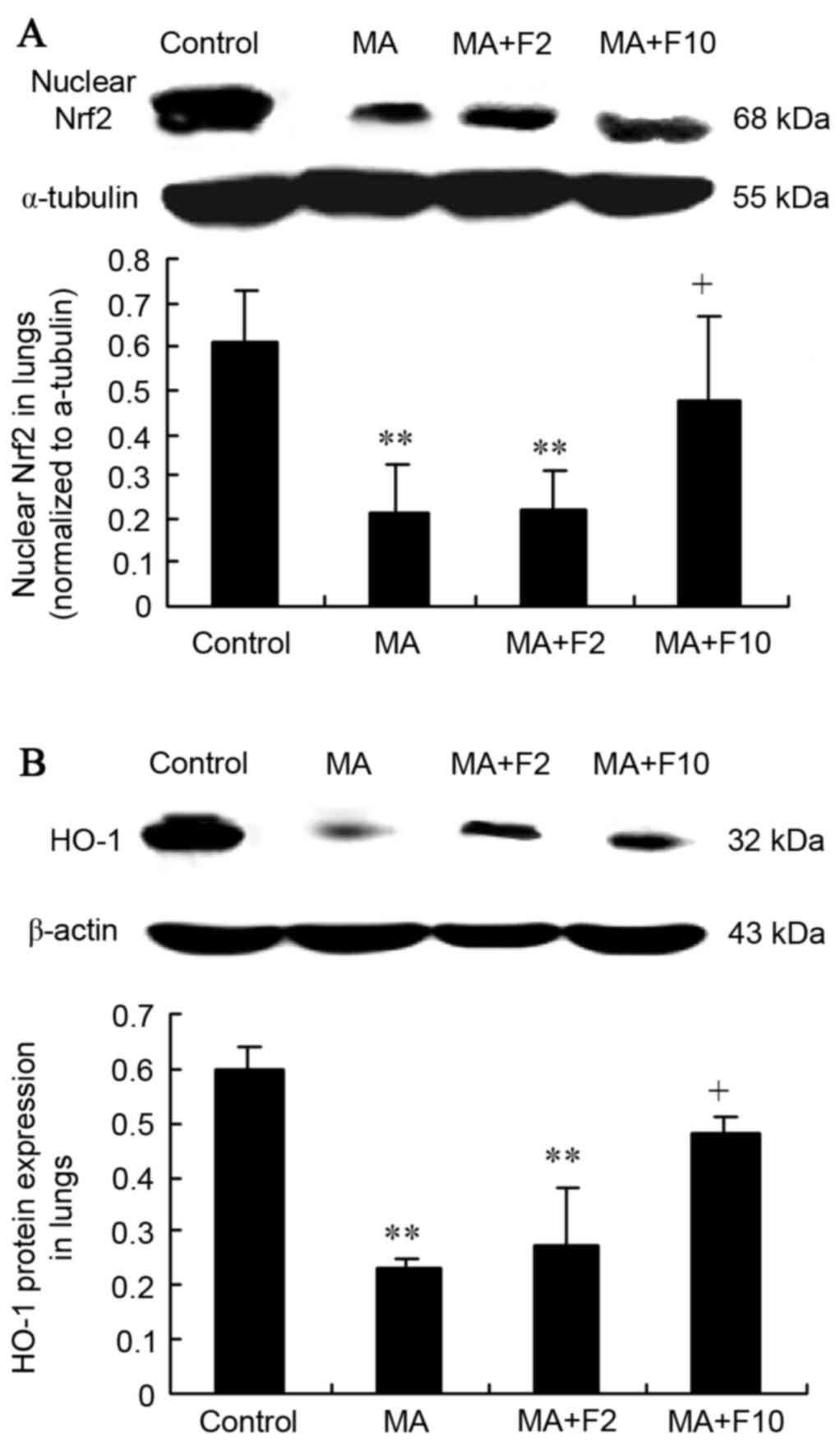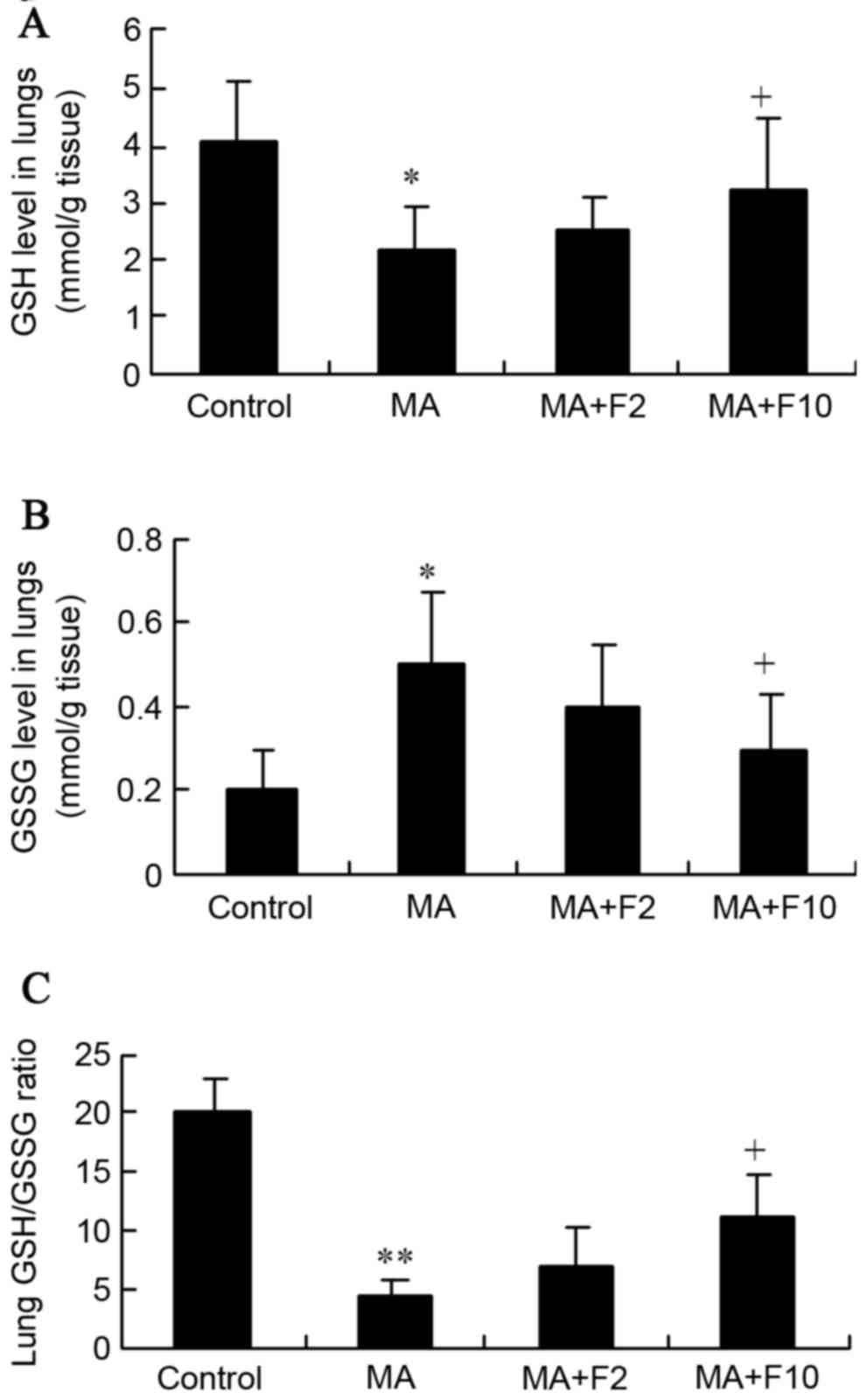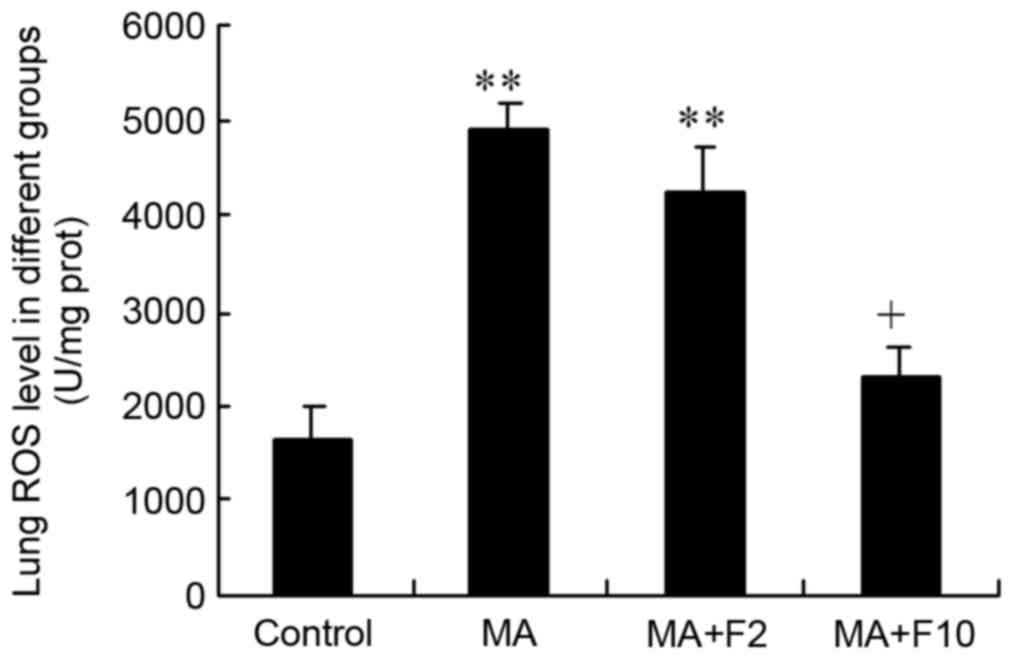|
1
|
Rawson RA: Current research on the
epidemiology, medical and psychiatric effects, and treatment of
methamphetamine use. J Food Drug Anal. 21:S77–S81. 2013. View Article : Google Scholar : PubMed/NCBI
|
|
2
|
Albertson TE, Derlet RW and Van Hoozen BE:
Methamphetamine and the expanding complications of amphetamines.
West J Med. 170:214–219. 1999.PubMed/NCBI
|
|
3
|
Volkow ND, Fowler JS, Wang GJ, Shumay E,
Telang F, Thanos PK and Alexoff D: Distribution and
pharmacokinetics of methamphetamine in the human body: Clinical
implications. PLoS One. 5:e152692010. View Article : Google Scholar : PubMed/NCBI
|
|
4
|
Peerzada H, Gandhi JA, Guimaraes AJ,
Nosanchuk JD and Martinez LR: Methamphetamine administration
modifies leukocyte proliferation and cytokine production in murine
tissues. Immunobiology. 218:1063–1068. 2013. View Article : Google Scholar : PubMed/NCBI
|
|
5
|
Ma J, Wan J, Meng J, Banerjee S,
Ramakrishnan S and Roy S: Methamphetamine induces autophagy as a
pro-survival response against apoptotic endothelial cell death
through the Kappa opioid receptor. Cell Death Dis. 5:e10992014.
View Article : Google Scholar : PubMed/NCBI
|
|
6
|
Wang Y, Liu M, Wang HM, Bai Y, Zhang XH,
Sun YX and Wang HL: Involvement of serotonin mechanism in
methamphetamine-induced chronic pulmonary toxicity in rats. Hum Exp
Toxicol. 32:736–746. 2013. View Article : Google Scholar : PubMed/NCBI
|
|
7
|
Hollinger MA: Drug-induced lung toxicity.
Int J Toxicol. 12:31–47. 1993. View Article : Google Scholar
|
|
8
|
Kushnir-Sukhov NM, Gilfillan AM, Coleman
JW, Brown JM, Bruening S, Toth M and Metcalfe DD:
5-hydroxytryptamine induces mast cell adhesion and migration. J
Immunol. 177:6422–6432. 2006. View Article : Google Scholar : PubMed/NCBI
|
|
9
|
de Las Casas-Engel M and Corbí AL, .
Serotonin modulation of macrophage polarization: Inflammation and
beyond. Adv Exp Med Biol. 824:89–115. 2014. View Article : Google Scholar : PubMed/NCBI
|
|
10
|
Mann DA and Oakley F: Serotonin paracrine
signaling in tissue fibrosis. Biochim Biophys Acta. 1832:905–910.
2013. View Article : Google Scholar : PubMed/NCBI
|
|
11
|
Tanaka T, Doe JM, Horstmann SA, Ahmad S,
Ahmad A, Min SJ, Reynolds PR, Suram S, Gaydos J, Burnham EL and
Vandivier RW: Neuroendocrine signaling via the serotonin
transporter regulates clearance of apoptotic cells. J Biol Chem.
289:10466–10475. 2014. View Article : Google Scholar : PubMed/NCBI
|
|
12
|
Liu M, Wang Y, Wang HM, Bai Y, Zhang XH,
Sun YX and Wang HL: Fluoxetine attenuates chronic
methamphetamine-induced pulmonary arterial remodelling: Possible
involvement of serotonin transporter and serotonin 1B receptor.
Basic Clin Pharmacol Toxicol. 112:77–82. 2013. View Article : Google Scholar : PubMed/NCBI
|
|
13
|
Dempsie Y and MacLean MR: Pulmonary
hypertension: Therapeutic targets within the serotonin system. Br J
Pharmacol. 155:455–462. 2008. View Article : Google Scholar : PubMed/NCBI
|
|
14
|
Morrell NW, Adnot S, Archer SL, Dupuis J,
Jones PL, MacLean MR, McMurtry IF, Stenmark KR, Thistlethwaite PA,
Weissmann N, et al: Cellular and molecular basis of pulmonary
arterial hypertension. J Am Coll Cardiol. 54(1 Suppl): S20–S31.
2009. View Article : Google Scholar : PubMed/NCBI
|
|
15
|
Dizeyi N, Hedlund P, Bjartell A, Tinzl M,
Austild-Taskén K and Abrahamsson PA: Serotonin activates MAP kinase
and PI3K/Akt signaling pathways in prostate cancer cell lines. Urol
Oncol. 29:436–445. 2011. View Article : Google Scholar : PubMed/NCBI
|
|
16
|
Wang Y, Han DD, Wang HM, Liu M, Zhang XH
and Wang HL: Downregulation of osteopontin is associated with
fluoxetine amelioration of monocrotaline-induced pulmonary
inflammation and vascular remodelling. Clin Exp Pharmacol Physiol.
38:365–372. 2011. View Article : Google Scholar : PubMed/NCBI
|
|
17
|
Singh M, Foster CR, Dalal S and Singh K:
Osteopontin: Role in extracellular matrix deposition and myocardial
remodeling post-MI. J Mol. Cell Cardiol. 48:538–543. 2010.
View Article : Google Scholar
|
|
18
|
Sahu BD, Mahesh Kumar J and Sistla R:
Baicalein, a bioflavonoid, prevents cisplatin-induced acute kidney
injury by up-regulating antioxidant defenses and down-regulating
the MAPKs and NF-κB pathways. PLoS One. 10:e01341392015. View Article : Google Scholar : PubMed/NCBI
|
|
19
|
Pandurangan AK, Mohebali N, Norhaizan ME
and Looi CY: Gallic acid attenuates dextran sulfate sodium-induced
experimental colitis in BALB/c mice. Drug Des Devel Ther.
9:3923–3934. 2015. View Article : Google Scholar : PubMed/NCBI
|
|
20
|
Ryu J, Kwon MJ and Nam TJ: Nrf2 and NF-κB
signaling pathways contribute to porphyra-334-mediated inhibition
of UVA-induced inflammation in skin fibroblasts. Mar Drugs.
13:4721–4732. 2015. View Article : Google Scholar : PubMed/NCBI
|
|
21
|
Saetta M, Shiner RJ, Angus GE, Kim WD,
Wang NS, King M, Ghezzo H and Cosio MG: Destructive index: A
measurement of lung parenchymal destruction in smokers. Am Rev
Respir Dis. 131:764–769. 1985.PubMed/NCBI
|
|
22
|
Rincon M and Irvin CG: Role of IL-6 in
asthma and other inflammatory pulmonary diseases. Int J Biol Sci.
8:1281–1290. 2012. View Article : Google Scholar : PubMed/NCBI
|
|
23
|
Lockett AD, Kimani S, Ddungu G, Wrenger S,
Tuder RM, Janciauskiene SM and Petrache I: α1-Antitrypsin modulates
lung endothelial cell inflammatory responses to TNF-α. Am J Respir
Cell Mol Biol. 49:143–150. 2013. View Article : Google Scholar : PubMed/NCBI
|
|
24
|
Stromps J, Fuchs P, Demir E, Grieb G,
Reuber K and Pallua N: Intraalveolar TNF-α in combined burn and
inhalation injury compared with intraalveolar interleukin-6. J Burn
Care Res. 36:e55–e61. 2015. View Article : Google Scholar : PubMed/NCBI
|
|
25
|
Rothman RB and Baumann MH: Therapeutic and
adverse actions of serotonin transporter substrates. Pharmacol
Ther. 95:73–88. 2002. View Article : Google Scholar : PubMed/NCBI
|
|
26
|
Cloëz-Tayarani I and Changeux JP: Nicotine
and serotonin in immune regulation and inflammatory processes: A
perspective. J Leukoc Biol. 81:599–606. 2007. View Article : Google Scholar : PubMed/NCBI
|
|
27
|
Wells SM, Buford MC, Porter VM, Brunell
HL, Bunderson-Schelvan M, Nevin AB, Cardozo-Pelaez F and Holian A:
Role of the serotonergic system in reduced pulmonary function after
exposure to methamphetamine. Am J Respir Cell Mol Biol. 42:537–544.
2010. View Article : Google Scholar : PubMed/NCBI
|
|
28
|
Tavoulari S, Forrest LR and Rudnick G:
Fluoxetine (Prozac) binding to serotonin transporter is modulated
by chloride and conformational changes. J Neurosci. 29:9635–9643.
2009. View Article : Google Scholar : PubMed/NCBI
|
|
29
|
Rose'Meyer R: A review of the serotonin
transporter and prenatal cortisol in the development of autism
spectrum disorders. Mol Autism. 4:372013. View Article : Google Scholar : PubMed/NCBI
|
|
30
|
Bai Y, Wang HM, Liu M, Wang Y, Lian GC,
Zhang XH, Kang J and Wang HL: 4-Chloro-DL-phenylalanine protects
against monocrotaline-induced pulmonary vascular remodeling and
lung inflammation. Int J Mol Med. 33:373–382. 2014.PubMed/NCBI
|
|
31
|
Chen HH, Wang TC, Lee YC, Shen PT, Chang
JY, Yeh TK, Huang CH, Chang HH, Cheng SY, Lin CY, et al: Novel
Nrf2/ARE activator, trans-coniferylaldehyde, induces a
HO-1-mediated defense mechanism through a dual p38α/MAPKAPK-2 and
PK-N3 signaling pathway. Chem Res Toxicol. 28:1681–1692. 2015.
View Article : Google Scholar : PubMed/NCBI
|
|
32
|
Ishikawa T: Genetic polymorphism in the
NRF2 gene as a prognosis marker for cancer chemotherapy. Front
Genet. 5:3832014. View Article : Google Scholar : PubMed/NCBI
|
|
33
|
Ni S, Wang D, Qiu X, Pang L, Song Z and
Guo K: Bone marrow mesenchymal stem cells protect against
bleomycin-induced pulmonary fibrosis in rat by activating Nrf2
signaling. Int J Clin Exp Pathol. 8:7752–7761. 2015.PubMed/NCBI
|
|
34
|
Richie JP Jr, Nichenametla S, Neidig W,
Calcagnotto A, Haley JS, Schell TD and Muscat JE: Randomized
controlled trial of oral glutathione supplementation on body stores
of glutathione. Eur J Nutr. 54:251–263. 2015. View Article : Google Scholar : PubMed/NCBI
|
|
35
|
Sinha-Hikim I, Shen R, Lee WN Paul, Crum
A, Vaziri ND and Norris KC: Effects of a novel cystine-based
glutathione precursor on oxidative stress in vascular smooth muscle
cells. Am J Physiol Cell Physiol. 299:C638–C642. 2010. View Article : Google Scholar : PubMed/NCBI
|
|
36
|
Qin T, Yin Y, Yu Q and Yang Q: Bursopentin
(BP5) protects dendritic cells from lipopolysaccharide-induced
oxidative stress for immunosuppression. PLoS One. 10:e01174772015.
View Article : Google Scholar : PubMed/NCBI
|
|
37
|
Wang AL, Niu Q, Shi N, Wang J, Jia XF,
Lian HF, Liu Z and Liu CX: Glutamine ameliorates intestinal
ischemia-reperfusion Injury in rats by activating the Nrf2/Are
signaling pathway. Int J Clin Exp Pathol. 8:7896–7904.
2015.PubMed/NCBI
|















